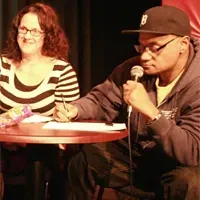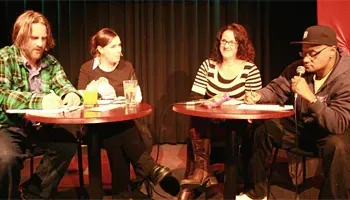From bro’Town to Sketch

Making the transition from animated comedy to sketch can be a leap of faith for any comedy writer.
In this Script to Screen Writer's Room a guest panel of local comedy revolutionaries speak candidly about the highs, lows, pitfalls and payoffs of writing sketch comedy.
* * *
For the July Writer’s Room MC screenwriter and script consultant Kathryn Burnett talked with writer/actor Oscar Kightley (Naked Samoans, bro’Town, Sione’s Wedding), producer Elizabeth Mitchell (bro’Town) and recent RadiRadiRah collaborator, writer/comedian/animator Guy Capper (The Pen/Robert and Sheepy).
Kathryn began the evening by asking Elizabeth how she was able to attract so many famous and talented people to work with her! Oscar answered the question, taking the opportunity to praise the talents of his long-time friend and collaborator.
“Elizabeth managed to get Prince Charles to appear on bro’Town,” he said. “She ambushed him at a play. Helen Clark was there too and when the Prince at first said ‘no’, she (Helen) said, ‘oh go on’ and he agreed. Elizabeth has these ideas of getting famous people and she chases them and keeps stalking them. She just hangs in there and doesn’t quit because she thinks it’d be cool to have them involved.”
Was it this never-say-die determination that inspired Elizabeth to move from animated comedy to a sketch show like RadiRadiRah, transitioning from the relative safety of animated comedy into the risky realm of sketch?
“bro’Town’s storylines were coming to a natural conclusion,” she said, “so we decided to rest it for a while. It’ll have another life soon hopefully! The genesis for RadiRadiRah was in another show we proposed to TV3 but didn’t work out.”
But the move to sketch was not without its challenges and uncertainties. “bro’Town characters were based on the Naked Samoans so we knew how they would behave in certain circumstances,” said Elizabeth. “But moving into sketch – we had to create new worlds for all the characters and that was the biggest challenge.”
Oscar said it was like making thirty television shows instead of just one. “The idea was to make one but we ended up creating a whole lot of little ones. Applying the details and all the rules to every part was important. It was quite the leap of faith, a real flexing of our creative muscles and it isn’t until you see an audience react that you know whether it has worked or not.”
Kathryn asked how the show was pitched to TV3.
Elizabeth said they wanted to do a sketch show but didn’t know much more than that at the time. “The original proposal changed a lot – even had a different name. There were so many changes from origin to air.”
Elizabeth and Oscar have known each other and worked together for a long time. The strength and trust inherent in their relationship inspired a creative collaboration which ensured the project would find its feet and move forward. “Our collaboration is multi-faceted,” said Elizabeth. “We work as one in lots of ways. We never argue and we tend to know what the other is thinking!”
Oscar spoke of a trust that has built up over the years. “If you can collaborate with people who are your friends and respect their work ethic and drive then it’s an extra bonus. It can be hard teaming up with strangers and getting that same chemistry.”
Kathryn asked the panel to describe the writing challenges of moving from animated comedy to sketch.
“It was easier in a way,” said Oscar, “even though we had to create lots of worlds. A sketch can be two pages as opposed to thirteen or more. It’s knowing what to cut and not being afraid to throw stuff out if it is not working, unless it is well and truly stink and then you give up.”
The team worked both in a group situation and individually during the story lining process. “We worked individually at first,” said Elizabeth, “then in groups and always with Oscar. We worked in short blocks of about two to four hours, for no other reason than it did well for us.”
Holding the vision when surrounded by talented people all wishing to make contributions can be hard. “You make it sound easy,” said Kathryn, “but we know comedy isn’t. How did you manage such a wonderful and wide range of contributors?”
“We improvised a lot!” said Guy.
As an example, Elizabeth described the work behind Taika Waititi’s RadiRadiRah alien. “We worked on that together, covering a whole ball park of ideas. Then we did half a day of improvisation and ended up using all kinds of bits and pieces. A lot of decisions were made in post production. Things that worked well were put together later.” An unconventional approach perhaps but it served the show well. TV3 was involved in the creative process right from the start.
Inspiration for RadiRadiRah was taken from such television legends as Little Britain and the classic Monty Python. “I took a count of the number of sketches they had in a show,” said Elizabeth. “We ended up doing more, maybe forty items in thirty minutes, whereas these shows would do about twenty.”
Recent collaborator Guy Capper has loved comedy from an early age. “I taught myself animation. You can actually do really well with limited materials using stop motion. I also focused on dialogue. I got together with Jemaine (Jemaine Clement of Flight of the Conchords) and we had this idea about two sheep sitting in a pub, kind of like the two old Muppet guys. Jemaine was ‘Robert’ and I was ‘Sheepy.’”
Viewers know these two ‘sheepy’ characters well and the sketch is extremely popular. “My mentors and those artists I admire have created characters you can fall in love with,” said Guy.
Guy advised aspiring comedians to get something made but added, “It helps to find it funny. Making short films is very worthwhile.”
Kathryn asked the panel if their perception of ‘funny’ had ever ‘not meshed’ with the audience and Elizabeth said she was surprised when bro’Town came out. “I’d been living with my creation for such a long time and people said, ‘it’s Polynesian!’ and I said, ‘it’s just New Zealand!’ I thought RadiRadiRah was quite normal but some said it was really out there and weird. I suppose that was interesting rather than surprising.”
Kathryn wondered if New Zealand audiences were too ‘P.C.’ about comedy, saying that apparently content of bro’Town and RadiRadiRah had proved offensive to some viewers. Audience reaction to the various sketches can be subjective. “What people find funny is very revealing about them,” said Oscar. “You’ll always get people who are offended by anything and it’s nice that these people get offended on our behalf. We need them to be moral watch dogs in our community.”
Kathryn pointed out that censoring and editing can be anathema to comedy but some content in the sketches did set alarm bells ringing for the creative team, in particular the material for Young Adolf. “Young Adolf could potentially upset people,” said Elizabeth. “We just wanted to make him look like a dick and we definitely stayed away from the red flags and were very careful. We didn’t want to offend.”
Oscar said the intention was always to make an interesting show, “… not one of those with sketches about taking the piss out of Winston Peters. We wanted to be open and wide in terms of subject matter, taking from history, exploring different areas of humour to see whether we could make them work for us. Stylistically, it is quite different for a New Zealand type of sketch show.”
Kathryn said that writing comedy can be thankless and harshly judged by New Zealand audiences and asked the panel how they keep going in the face of adverse responses.
“Comedy is a good area to work in,” said Oscar. “True laughter is quite instinctive. You can’t fake it. To have that connection and relationship with an audience is pretty awesome. If you can make people laugh it’s really cool.”
Elizabeth said she keeps going with comedy simply because she loves it so much. “The criterion is always ‘does it make me laugh?’ I can’t think, ‘oh, will that person find it funny?’ I find comedy fun to do.”
Guy said he has always believed and had faith in comedy. “I have always thought that if I could tell myself in kindergarten not to worry because ‘when I grow up I’ll be making funny animals talk for a job’ then I would be very happy indeed”
Kathryn was curious to know what lessons the team had learned along the comedy journey and Oscar replied, “I learned that half the challenge is getting funny people together, those people that you find funny. The process is quite difficult so if people are laughing when they’re working on it then that’s what keeps Elizabeth at the office overnight to get it out because you know someone will like it. Comedy is hard but it should come easily. If it’s too hard then it’s not working. Take it a different way until it works.”
And what does the future hold? Series Two of RadiRadiRah? “I have yet to talk to TV3 about that,” said Elizabeth, “but I hope they say yes. Also, a bro’Town movie is on the drawing board.”
Oscar said they have already written “about twenty drafts” for the bro’Town movie, “… and it’s changed heaps. I did the Steve Kaplan workshop recently and thought, ‘Let’s start again!’”
Kathryn opened the floor for questions and the first asked the panel if TV3 had turned down anything that had been proposed to them.
“They turned down a sketch idea with Taika as a scientist,” said Elizabeth, “and the alien nearly didn’t make it. In fact, the alien sketch was the most polarising. People either hated it or loved it.”
A second question centred on the material and the production lead in times. If something wasn’t working, did the schedule provide adequate opportunities to address the problem?
“We did that most successfully with a cartoon called Cheese and the City,” said Elizabeth. “We played it to friends and colleagues and no one laughed. It was hard because we’d made a number of episodes but it just didn’t fit and so we dropped it. That was a tough call.”
“When nobody laughs … that’s a dead giveaway,” said Oscar. “Look for those moments when the universe whispers…”
Guy spoke of opportunities to improvise in the studio and the luxury of time to pick what worked best. “Sometimes we choose items that are the most spontaneously produced,” said Elizabeth. “We might head for more of that in the future.”
And is the international market in their sights?
“We will target Australia and England,” said Elizabeth. “They loved bro’Town in Russia! We won’t dumb down the material although we do keep this in mind because we want to be sure the New Zealand references are understood by an international audience – and in the United States too!”
Written for Script to Screen by Jane Bissell
